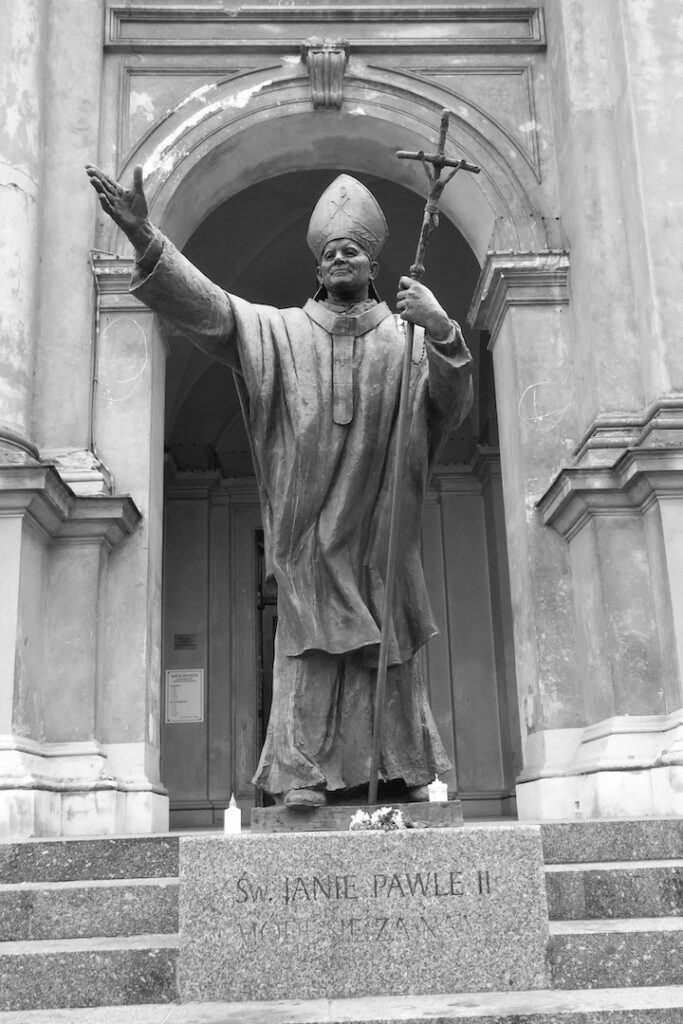Today, August 6, we celebrate the Feast of the Lord’s Transfiguration according to the liturgical calendar. It also happens to be the 30th anniversary of the release of Veritatis Splendor, Pope Saint John Paul II’s encyclical on Catholic moral theology, which has recently come under attack.
When the New York Times reported on the release of Veritatis Splendor, the newspaper’s ”Quote of the Day” was from Msgr. William B. Smith (1939-2009). If you knew Msgr. Smith, you knew his reputation for characterizing moral positions, bad ones especially, with a memorable turn of phrase. The Times started with Msgr. Smith’s own position on Veritatis Splendor. “For me it is a moral masterpiece.” About others who might not see the encyclical in quite the same way, the one-time professor of moral theology said that to them it “may be a moral horror.”
The contrast in Msgr. Smith’s characterization is helpful, especially when moral positions present us with two starkly different moral visions. Who wouldn’t want to have a moral theology that is a masterpiece? And who wouldn’t want to steer clear of a moral theology that is a horror? Yet those weren’t exactly the words used by the Fathers of the Second Vatican Council. Optatum Totius, the Decree on Priestly Training, called for renewal or perfection of moral theology. The renewal or perfection, they said, would be achieved by focusing “more on the teaching of the Bible.”
Veritatis Splendor contains that Biblical enrichment and much more. Almost the entirety of Chapter One is a reflection on the incident in Jesus’ public ministry wherein the rich young man inquires about the good he must do to inherit eternal life. (Matthew 19:16-22) As good as that reflection by Pope Saint John Paul II is on the encounter of Jesus with the rich young man, “the much more” I cited above is where we find the excellence of Veritatis Splendor.
In Chapter Two, the Holy Father goes on to offer a critique of the mistaken concept of freedom prevailing today. He observes there has been an absolutizing of freedom and it has resulted in a conflict with material and biological nature. That freedom now defines itself and even creates its own values.
This shift is reminiscent of the break or rupture known as Dualism, including what is called Manichaean Dualism. This would be the idea that matter is not something good but really, in its essence, is actually evil. It is not the misuse of matter which brings about evil; rather, matter’s very existence does. This conception strikes most of us as altogether peculiar, but history is filled with abundant examples of such aberrations. The second part of the pope’s critique of disordered freedom is the desire for isolation. In isolation from the truth, normativity, and goodness, objectively understood, freedom acts like an independent contractor, hiring itself out to the highest bidder.

In this scenario, the will acts like an accomplice to freedom’s self-debilitation. Indeed, there’s a clear line connecting Immanuel Kant’s categorical imperative (to will as if your act were to become a universal law). We can see also the short distance from there to Friedrich Nietzsche’s Superman. Reality is thus determined by what my will wills – nothing more and nothing less.
This jaundiced take on reality is being played out right now in what is generally known as “gender-affirming care” and gender “transitioning.” The will shares in the culpability too. Using a false assertion of the will’s dominance over everything, the rightly ordered values in nature itself are jettisoned.
Pope Francis has referred to gender ideology as demonic. There’s always, however, the need to make arguments, philosophical arguments especially, that refute malevolent practices without explicit references to the Devil. We can do that because of the masterpieces that belong to our moral inheritance as Catholics. And, yes, it is good to have distinguished moralists like Msgr. Smith point that out for us. Otherwise, we run the risk of having moral horrors creep up on us without the resources to defend an intelligent faith and right reason.
In discussions and debates over gender-affirming care and gender transitioning, we need to keep in mind another point emphasized in Veritatis Splendor: the unity of the soul and the body in every person. John Paul II reminds us of the traditional teaching that a soul expresses itself in a body, and a body is informed by an immortal spirit. He adds too that “by rejecting all manipulations of corporeity which alter its human meaning, the Church serves man and shows him the path of true love, the only path on which he can find the true God.”
Nothing less then is at stake than the Church’s duty of guarding the dignity of the person when it comes to the threat posed by gender ideology as Pope Francis calls it. Not to take up this duty is to acquiesce in moral horror, the kind which originates with human caprice and winds up mocking the divine design. If we don’t persevere and win the fight over the meaning of gender, we will witness what amounts to a silencing if not a cancellation of the truth found in the Book of Genesis:
God created man in his image, in the divine image he created him; male and female he created them. (Genesis 1:27)
God got gender right, and we must too. Otherwise, we may not be able to tell the difference any longer between a moral masterpiece and a moral horror.















